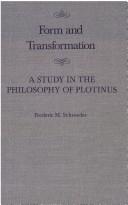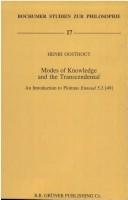| Listing 1 - 10 of 20 | << page >> |
Sort by
|
Book
ISBN: 9781107040243 9781139628761 9781461953371 1461953375 1139628763 9781107703872 1107703875 1107040248 1139894722 1107703034 1107691664 1107598443 1107668360 1108729940 1306212219 Year: 2013 Publisher: New York
Abstract | Keywords | Export | Availability | Bookmark
 Loading...
Loading...Choose an application
- Reference Manager
- EndNote
- RefWorks (Direct export to RefWorks)
Plotinus, Self and the World addresses the question of the individual subject in its relationship with the world, the 'all'. It traces the self through its experience of memory and forgetfulness, looks at whether the idea of the subconscious exists in Plotinus, and notes the probable impact of Plotinus' thought on the development of the autobiography, in the form of Augustine's Confessions. Augustine historicises the Plotinian individual self. The book reinterprets the idea of to oikeion in Plotinus and places great emphasis on the importance of the idea of 'having', and the ability to possess is itself linked to being: thus we are close to the idea of personal authenticity. Lastly the book examines Plotinus' view of images and art, and notes his respect for the beauty of the human face. His positive view of the physical world is stressed.
Book
ISBN: 9789004203266 9004203265 9786613161505 1283161508 9004216391 9789004216396 Year: 2011 Volume: *11 11 Publisher: Leiden Brill
Abstract | Keywords | Export | Availability | Bookmark
 Loading...
Loading...Choose an application
- Reference Manager
- EndNote
- RefWorks (Direct export to RefWorks)
The point of view put forth in the following pages differs greatly from the common perspective according to which the treatises 30 to 33 constitute a single work, a Großschrift , and this single work, Plotinus’ essential response to the Gnostics. Our perspective is that of an ongoing discussions with his “Gnostic”—yet Platonizing—friends, which started early in his writings (at least treatise 6), developed into what we could call a Großzyklus (treatises 27 to 39), and went on in later treatises as well (e. g. 47-48, 51). The prospect of an ongoing discussion with the Gnostics bears an additional virtue, that of allowing for a truly dynamic understanding of the Plotinian corpus.
Gnosticism. --- Plotinus. --- Plotinus --- Gnosticisme --- Gnosticism --- Cults --- Plotin (0205?-0270) --- Influence --- Plotinus. - Enneads
Book
ISBN: 9781930972919 9781930972926 1930972911 193097292X Year: 2015 Publisher: Las Vegas
Abstract | Keywords | Export | Availability | Bookmark
 Loading...
Loading...Choose an application
- Reference Manager
- EndNote
- RefWorks (Direct export to RefWorks)
Soul. --- Ame --- Plotinus. --- Ontologie --- Un (L'Un en philosophie) --- Âme --- Plotin. --- Pneuma --- Future life --- Philosophical anthropology --- Theological anthropology --- Animism --- Spirit
Book
ISBN: 9781930972377 1930972377 9781930972643 1930972644 9781930972643 Year: 2017 Publisher: Las Vegas
Abstract | Keywords | Export | Availability | Bookmark
Book
ISBN: 9004357165 9789004357167 9789004357037 9004357033 Year: 2018 Publisher: Leiden, The Netherlands ; Boston, [Massachusetts] : Brill Rodopi,
Abstract | Keywords | Export | Availability | Bookmark
 Loading...
Loading...Choose an application
- Reference Manager
- EndNote
- RefWorks (Direct export to RefWorks)
Plotinus and the Moving Image offers the first philosophical discussion on Plotinus' philosophy and film. It discusses Plotinian concepts like 'the One' in a cinematic context and relates Plotinus' theory of time as a transitory intelligible movement of the soul to Bergson’s and Deleuze’s time-image. Film is a unique medium for a rapprochement of our modern consciousness with the thought of Plotinus. The Neoplatonic vestige is particularly worth exploring in the context of the newly emerging “Cinema of Contemplation.” Plotinus' search for the 'intelligible' that can be grasped neither by sense perception nor by merely logical abstractions leads to a fluent way of seeing. Parallels that had so far never been discussed are made plausible. This book is a milestone in the philosophy of film. Contributors are: Cameron Barrows, Thorsten Botz-Bornstein, Michelle Phillips Buchberger, Steve Choe, Stephen Clark, Vincenzo Lomuscio, Tony Partridge, Daniel Regnier, Giannis Stamatellos, Enrico Terrone, Sebastian F. Moro Tornese and Panayiota Vassilopoulou.
Motion pictures --- Philosophy. --- Plotinus. --- Plotin --- Plotinos --- Boluoding --- Iflūṭīn --- Plotino --- Plōtinos --- Plotinus, --- Plotyn --- Πλωτι̂νος --- פלוטינוס --- أفلوطين

ISBN: 1282856480 9786612856488 0773564101 9780773564107 0773510168 9780773510166 Year: 1992 Publisher: Montreal : Buffalo : McGill-Queen's University Press,
Abstract | Keywords | Export | Availability | Bookmark
 Loading...
Loading...Choose an application
- Reference Manager
- EndNote
- RefWorks (Direct export to RefWorks)
The Platonic Form is often presented as an instrument of explanation and as a cause in ontology, epistemology, and ethics. As such, it is usually approached from the perspective of its relations to the particulars of the sensible world. Frederic Schroeder contends that Plotinus argues for the sovereignty of the Platonic Form both as a ground of being and as an intrinsically valuable object of intellective and spiritual vision. These two aspects coalesce in the thought of Plotinus, for whom the Form is, apart from its philosophical uses, an object of enjoyment. Schroeder argues also that the particular must be seen as having an intrinsic character, distinct from its relationship to the Form or to other particulars. The particular thus becomes a window on the world of Form. In the course of his exploration of the sovereignty of Form, Schroeder examines the themes of illumination, silence, language, and love. He undertakes an immanent interpretation of the Plotinian text, showing how Plotinian vocabulary displays intricate internal connections and genetic relationships. Schroeder shows that Plotinus' thought is not susceptible to organization into a closed, linear synthesis but has its own order, centred on the conviction that Form is of intrinsic value and that it is only from the perspective of this intrinsic value that we can understand its uses and significance in explanation and causation. Rather than trying to construct such a synthesis, Schroeder, starting from this basic insight into Plotinus' understanding of the Platonic Form, leads the reader to a greater understanding of Plotinus' manner of philosophizing.
Form (Philosophy) --- Idealism --- Matter --- Metaphysics --- Structuralism --- Plotinus --- Plotin --- Plotinos --- Contributions in metaphysics. --- Boluoding --- Iflūṭīn --- Plotino --- Plōtinos --- Plotinus, --- Plotyn --- Πλωτι̂νος --- פלוטינוס --- أفلوطين
Book
ISBN: 9004510206 9004510192 Year: 2022 Publisher: Brill
Abstract | Keywords | Export | Availability | Bookmark
 Loading...
Loading...Choose an application
- Reference Manager
- EndNote
- RefWorks (Direct export to RefWorks)
"In this book, Ota Gál presents a new analysis of Plotinus' conception of beauty, beginning from a close reading of treatises I.6 and V.8, which link beauty with the unified multiplicity of Intellect. This account is subsequently placed in a hierarchical and structural context in VI.2 and VI.6 and connected to illumination in VI.7, enabling us to determine the meaning of the predicate "beauty" at different ontological levels. For Plotinus, beauty is ultimately the illuminated unity in multiplicity of Intellect, which, as the manifestation of the Good, simultaneously enables the soul's ascent and threatens to bind the soul to itself"--
Aesthetics --- Early works to 1800. --- Plotinus. --- Boluoding --- Iflūṭīn --- Plotin --- Plotino --- Plōtinos --- Plotinus, --- Plotyn --- Πλωτι̂νος --- פלוטינוס --- أفلوطين --- Radio broadcasting Aesthetics

ISBN: 906032319X 9789060323199 9786613328212 1283328216 9027277982 9789027277985 Year: 1991 Volume: 17 Publisher: Amsterdam Philadelphia B.R. Grüner
Abstract | Keywords | Export | Availability | Bookmark
 Loading...
Loading...Choose an application
- Reference Manager
- EndNote
- RefWorks (Direct export to RefWorks)
The philosophy of Plotinus is usually depicted as a quest for the absolute, outside and beyond the world of human knowledge and experience. Yet in the late treatise Ennead 5.3 [49], Plotinus shows himself a philosopher of the transcendental, rather than of the transcendent. Starting from a critical analysis of the idea of self-knowledge, he develops a world-view in which central notions of his metaphysics are represented, not as different "hypostases" or transcendent beings, but as limiting cases of reality as we human beings know it. Fundamental to this world-view is Plotinus' assumpti
Knowledge, Theory of --- History. --- -Epistemology --- Theory of knowledge --- Philosophy --- Psychology --- History --- Plotinus --- Plotin --- Plotinos --- Théorie de la connaissance --- Histoire --- Plotinus. --- Knowledge [Theory of ] --- Plotinus. Enneads. V, 3. --- Knowledge, Theory of - History.
Book
ISBN: 9461661703 9789461661708 9789462700024 Year: 2014 Publisher: Leuven, Belgium
Abstract | Keywords | Export | Availability | Bookmark
 Loading...
Loading...Choose an application
- Reference Manager
- EndNote
- RefWorks (Direct export to RefWorks)
The nature of intelligible Forms received different interpretations from various ancient Platonists. This book sketches the history of these interpretations from Antiochus to Plotinus and shows the radical transformation this theory underwent in the hands of the latter. Pre-Plotinian Platonists considered the Forms as "thoughts of god" and made the causal role of the Forms depend on the craftsman-god. Plotinus rejected this "artificialist" model. Instead he considered the Forms as living and intellective realities and thereby turned the paradigmatic causality of the intelligible on its head. The Forms are themselves active and the demiurge is no longer needed as a causal agent separate from the Forms. Plotinus incorporated key concepts of Aristotelian theology and included them in a doctrine of the causality of the Forms, thus overcoming Aristotle's objections against Platonic Forms.
Neoplatonism. --- Alexandrian school --- Church history --- Hellenism --- Philosophy --- Philosophy, Ancient --- Platonists --- Theosophy --- Plotinus. --- Plotin --- Plotinos --- Plotinus --- Criticism, Textual. --- Boluoding --- Iflūṭīn --- Plotino --- Plōtinos --- Plotinus, --- Plotyn --- Πλωτι̂νος --- פלוטינוס --- أفلوطين
Book
ISBN: 1108246338 1108233015 1108415288 1108244629 9781108233019 9781108415286 9781108401135 Year: 2019 Publisher: Cambridge : Cambridge University Press,
Abstract | Keywords | Export | Availability | Bookmark
 Loading...
Loading...Choose an application
- Reference Manager
- EndNote
- RefWorks (Direct export to RefWorks)
The extensive influence of Plotinus, the third-century founder of 'Neoplatonism', on intellectual thought from the Renaissance to the modern era has never been systematically explored. This collection of new essays fills the gap in the scholarship, thereby casting a spotlight on a current of intellectual history that is inherently significant. The essays take the form of a series of case-studies on major figures in the history of Neoplatonism, ranging from Marsilio Ficino to Henri-Louis Bergson and moving through Italian, French, English, and German philosophical traditions. They bring clarity to the terms 'Platonism' and 'Neoplatonism', which are frequently invoked by historians but often only partially understood, and provide fresh perspectives on well-known issues including the rise of 'mechanical philosophy' in the sixteenth century and the relation between philosophy and Romanticism in the nineteenth century. The volume will be important for readers interested in the history of thought in the early-modern and modern ages.
Platonists. --- Neoplatonism. --- Alexandrian school --- Church history --- Hellenism --- Philosophy --- Philosophy, Ancient --- Platonists --- Theosophy --- Platonism --- Philosophers --- Plotinus --- Plotin --- Plotinos --- Influence. --- Boluoding --- Iflūṭīn --- Plotino --- Plōtinos --- Plotinus, --- Plotyn --- Πλωτι̂νος --- פלוטינוס --- أفلوطين --- Neoplatonism
| Listing 1 - 10 of 20 | << page >> |
Sort by
|

 Search
Search Feedback
Feedback About UniCat
About UniCat  Help
Help News
News